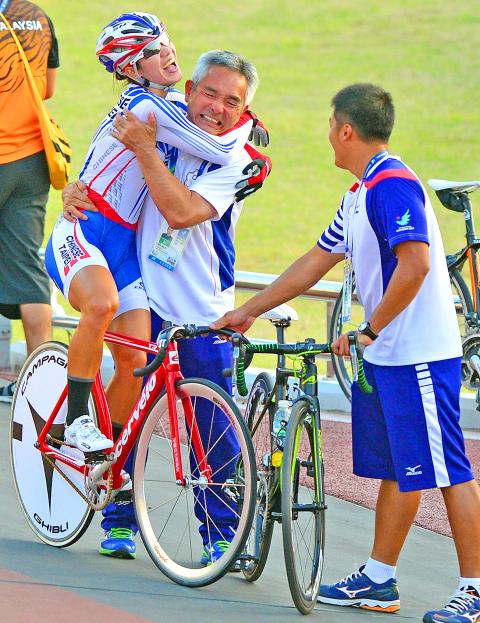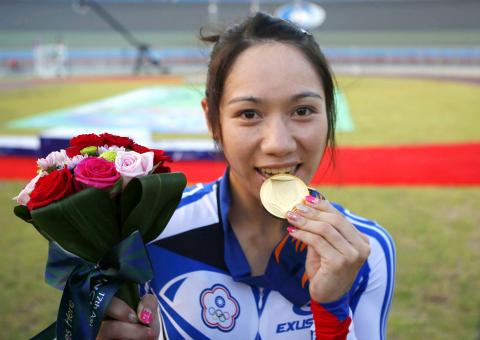Taiwan’s Hsiao Mei-yu (蕭美玉) struck gold in the track cycling yesterday, winning the women’s omnium, while rowers Wang Ming-hui (汪明輝) and Yu Tsung-wei (游宗威) claimed silver in the men’s double sculls at the Asian Games in Incheon, South Korea.
Hsiao, whose father died when she was seven years old and whose mother left her shortly afterwards, used the prize money from her second-place finish in the women’s 500m time trial at the 2006 Games in Doha, Qatar, to repair her father’s grave.
Now she is a gold medalist after finishing second in the scratch race, third in the individual pursuit and winning the elimination race, the time trial, the flying lap and the final points race to tot up 227 points and relegating China’s Luo Xiaoling (羅曉玲) to second place in cycling’s multi-event discipline.

Photo: Wang Yi-sung, Taipei Times
Wang and Yu completed the 2,000m in the final of the double sculls in 6 minutes, 29.11 seconds to collect silver behind Zhang Liang (張亮) and Dai Jun (戴軍) of China at the Chungju Tangeum Lake Rowing Center.
In the archery, Taiwan’s compound women’s team defeated India 226-224 in their semi-final to guarantee at least a silver medal in the competition. They face South Korea in the final tomorrow after the hosts beat Iran 229-222.
In the compound women’s individual quarter-finals, 24-year-old Taiwanese archer Huang I-jou (黃逸柔) defeated Indonesia’s Dellie Threesyadinda 141-132 to set up a semi-final against South Korea’s Choi Bo-min tomorrow.

Photo: Reuters
Taiwan’s Pan Cheng-tsung (潘政琮) took a one-shot lead after the first round of the men’s individual golf competition after carding a six-under 66, while the Taiwanese men also grabbed the joint lead in the team competition along with South Korea.
In the tennis, top seed and world No. 43 Lu Yen-hsun (盧彥勳) took just 41 minutes to defeat Pakistan’s Aqeel Khan 6-0, 6-1 in the second round of the men’s singles, while fellow Taiwanese Wang Yeu-tzuoo (王宇佐) made short work of Yemen’s Ghassan Alansi, winning 6-2, 6-1.
In the second round of the women’s singles, Taiwan’s Hsu Chieh-yu (許絜瑜) defeated Hong Kong’s Wu Ho Ching (胡可澄) 6-4, 6-0 in 1 hour, 23 minutes, while in the second round of the women’s doubles, top-seeded Taiwanese sisters Chan Yung-jan (詹詠然) and Chan Hao-ching (詹皓晴) took just 46 minutes to see off Mongolian pairing Erdenesuren Erdenebat and Jargai Altansarnai 6-1, 6-1.
Lu then teamed up with Hsieh Su-wei (謝淑薇) in the first round on the mixed doubles as the No. 7 seeds took just 36 minutes to defeat Mongolian duo Badrakh Munkhbaatar and Altansarnai 6-0, 6-1.

CHAOS: Iranians took to the streets playing celebratory music after reports of Khamenei’s death on Saturday, while mourners also gathered in Tehran yesterday Iranian Supreme Leader Ayatollah Ali Khamenei was killed in a major attack on Iran launched by Israel and the US, throwing the future of the Islamic republic into doubt and raising the risk of regional instability. Iranian state television and the state-run IRNA news agency announced the 86-year-old’s death early yesterday. US President Donald Trump said it gave Iranians their “greatest chance” to “take back” their country. The announcements came after a joint US and Israeli aerial bombardment that targeted Iranian military and governmental sites. Trump said the “heavy and pinpoint bombing” would continue through the week or as long

TRUST: The KMT said it respected the US’ timing and considerations, and hoped it would continue to honor its commitments to helping Taiwan bolster its defenses and deterrence US President Donald Trump is delaying a multibillion-dollar arms sale to Taiwan to ensure his visit to Beijing is successful, a New York Times report said. The weapons sales package has stalled in the US Department of State, the report said, citing US officials it did not identify. The White House has told agencies not to push forward ahead of Trump’s meeting with Chinese President Xi Jinping (習近平), it said. The two last month held a phone call to discuss trade and geopolitical flashpoints ahead of the summit. Xi raised the Taiwan issue and urged the US to handle arms sales to

BIG SPENDERS: Foreign investors bought the most Taiwan equities since 2005, signaling confidence that an AI boom would continue to benefit chipmakers Taiwan Semiconductor Manufacturing Co’s (TSMC, 台積電) market capitalization swelled to US$2 trillion for the first time following a 4.25 percent rally in its American depositary receipts (ADR) overnight, putting the world’s biggest contract chipmaker sixth on the list of the world’s biggest companies by market capitalization, just behind Amazon.com Inc. The site CompaniesMarketcap.com ranked TSMC ahead of Saudi Aramco and Meta Platforms Inc. The Taiwanese company’s ADRs on Tuesday surged to US$385.75 on the New York Stock Exchange, as strong demand for artificial intelligence (AI) applications led to chip supply constraints and boost revenue growth to record-breaking levels. Each TSMC ADR represents

State-run CPC Corp, Taiwan (CPC, 台灣中油) yesterday said that it had confirmed on Saturday night with its liquefied natural gas (LNG) and crude oil suppliers that shipments are proceeding as scheduled and that domestic supplies remain unaffected. The CPC yesterday announced the gasoline and diesel prices will rise by NT$0.2 and NT$0.4 per liter, respectively, starting Monday, citing Middle East tensions and blizzards in the eastern United States. CPC also iterated it has been reducing the proportion of crude oil imports from the Middle East and diversifying its supply sources in the past few years in response to geopolitical risks, expanding